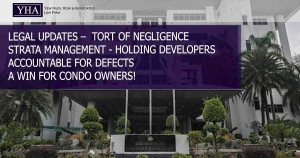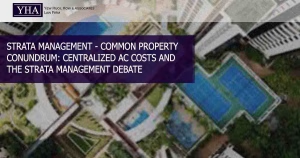
TORT OF NEGLIGENCE – STRATA MANAGEMENT – HOLDING DEVELOPERS ACCOUNTABLE FOR DEFECTS – A WIN FOR CONDO OWNERS!
The decision in Badan Pengurusan Bersama Subang Parkhomes v Zen Estates Sdn Bhd (Fadhlullah & Associates Consulting Engineers Sdn Bhd) [2025] 7 MLJ 780 emphasizes developers’ clear duty of care toward condominium residents, reinforcing their responsibility to properly rectify defects. It highlights the essential role developers play in ensuring quality and compliance, protecting residents from bearing unnecessary financial burdens arising from poorly completed projects.


